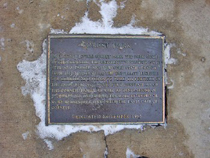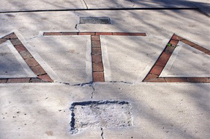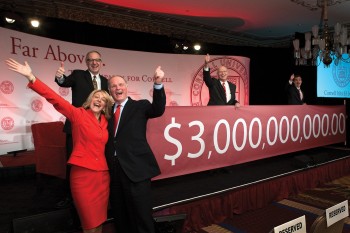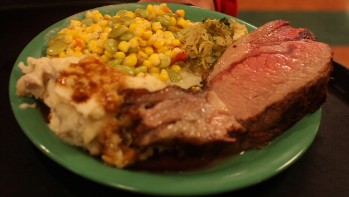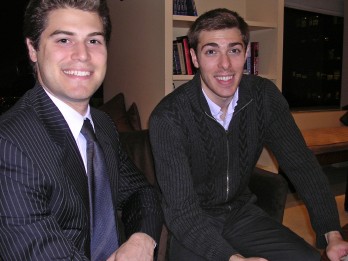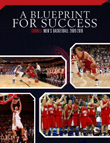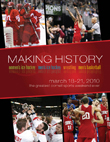ESSENTIALS
AROUND CAMPUS
Ezra lived here, too
An Essentials item in the winter 2010 issue mentioned a new plaque put up at the restored Sigma Phi house on West Campus (1 Forest Park Lane) – a plaque that paid formal tribute to the fact that the house sits on what was a portion of university founder Ezra Cornell's original homestead (in fact, a wall and blocker tie rings in the basement were likely part of Cornell's original barn).
The story indicated that the plaque, along with the Ezra Cornell statue and the crypt at Sage Chapel, are the only obvious places on campus that pay formal tribute to Ezra Cornell.
However, the nearby Delta Tau Delta house at 104 Mary Ann Wood Drive was built in 1965 on the site of Forest Park, Ezra Cornell's farm home, and for many years a plaque in front of that house (see photo) paid tribute to the location.
The plaque stated: "On this site stood Forest Park, the farm home of Ezra Cornell. The university's founder lived here from 1857 to 1869 while the university received its charter and began to build on portions of the farm. Here also lived four generations of the Cornell family as well as generations of students. No other site has more extended or more meaningful links with the early days of Cornell."
Forest Park was torn down in 1965 for construction of Delta Tau Delta house, which was dedicated in November of that year.
The plaque stood on a pedestal in front of the Delta Tau Delta house for many years and was moved to a spot in the sidewalk pavement in front of the house more than a decade ago. According to Young Hur, Delta Tau Delta president, the plaque was removed last semester due to damage from weathering. A replacement plaque has been ordered.
MILESTONESCampaign surpasses $3 billion mark
Cornell has reached the $3 billion mark in its "Far Above" fundraising campaign, a record-breaking amount achieved by only a handful of other universities. Campaign co-chairs Jan Rock Zubrow '77 and Stephen Ashley '62, MBA '64, announced the milestone on Nov. 18 at "Cornell on the Charles," an event attended by hundreds of Boston-area Cornellians. Bob Appel '53, chair of Weill Cornell Medical College's "Discoveries" campaign, was unable to be at the event. At the ceremonial groundbreaking for Weill Cornell's new Medical Research Building last May, it was announced that the college had hit the $1 billion mark towards its $1.3 billion portion of the larger campaign.
Since launching the $4 billion campaign in 2006, Cornell has significantly increased its financial aid program for students as part of its commitment to need-blind admissions, established new professorships, created funds to assist the graduate and professional schools, and raised support for new medical institutes and professorships at Weill Cornell.
Above: Zubrow and Ashley, foreground, celebrate with (from left to right) President David Skorton, Cornell Board of Trustees Chairman Peter Meinig '62 and Vice President for Alumni Affairs and Development Charles Phlegar. At right: Bob Appel '53, chair of the Weill Cornell Medical College campaign.
DOWNLOAD THIS'CU in the Kitchen'
Check out the debut episode of "CU in the Kitchen" on CornellCast, www.cornell.edu/video?videoID=903, with host Dan Gaibel and Senior Executive Chef Steven Miller, as they showcase preparations for the Fall Harvest Dinner, featuring local, regional and New York state produce, dairy products, beef and more.
With four certified executive chefs and two graduates from the Culinary Institute of America, eating at Cornell means enjoying some of the best campus food in the country. Cornell Dining maintains a commitment to sustainability seen in initiatives such as trayless dining, composting/recycling, and locally sourced food products.
ENTERPRISING ALUMSEnablers of the app economy
Ben Roberts '10, left, and Alexander Veach '09, M.Eng. '10, right, are the founders of Terran Exchange, which was the August monthly winner at discoveringstartups.com – and represents that site's most popular startup of all time. Roberts reached out to a network of Cornellians for the competition and credited the Cornell community with amassing the 1,986 votes TerranExchange.com collected.
The site, which launched in early December, gives commercial software developers an open free market system in which to present their products; users can rate, review and purchase limited licenses and, through social media, freelancers and companies can interact with a community of buyers.
Roberts says he wants Terran Exchange to be able to give smaller application software companies the ability to compete with the much larger companies that dominate the market.
"We call Terran Exchange 'The Marketplace for Ideas' because the best products rise in a merit-based free market system," Veach says, noting that he and Roberts anticipate tremendous growth in apps and software.
OFF THE PRESSTwo books highlight Cornell's historic 2010 sports year
Two commemorative books on Cornell's historic 2010 year in sports are now available; proceeds from the sale of the books will benefit Cornell athletics.
"A Blueprint For Success: Cornell Men's Basketball 2009-10," commemorates the year the Cornell men's basketball team won its third straight Ivy League Championship and set a record for most wins in one season by an Ivy League team. It was the first Cornell team to win a game in the NCAA Tournament and to make it to the Sweet 16.
"Making History, March 18-21, 2010: The Greatest Cornell Sports Weekend Ever!" highlights the record-setting performances and game-changing moments for four Cornell winter sports teams – wrestling, men's basketball and men's and women's hockey.
Both books are published by Ithaca-based MomentumMedia and myTEAMBOOK.net, in conjunction with the Cornell Department of Athletics, and are available online and at the Cornell Store.
SHELF LIFE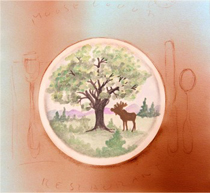
Early drawing of Moosewood Restaurant logo. Image provided by The Moosewood Collective and Cornell University Library. See larger image
Growing up Moosewood
The Moosewood Restaurant – which Bon Appetit magazine named one of the 13 most influential eateries of the 20th century – recently donated its earliest menus, cookbook drafts, drawings, ads and other documents to Cornell University Library. Known by Cornellians as an Ithaca favorite since 1973, Moosewood has become an icon of vegetarian cooking and cuisine.
Members of the Moosewood Collective – who called themselves "Moosers" – may have appeared to be veggie-loving free spirits, but underneath the hippie exterior, they were smart and savvy businesspeople. A typewritten mid-'80s policy manual, "The Moosers' Book of Harmonious Functions," shows how organized the collective really was, with serious policies on business matters like corporate officers, ownership percentages and joint responsibility for loans.
In addition to the serious stuff, the manual includes this poem about the dress code:
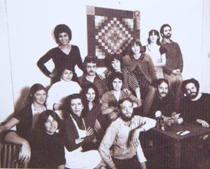
Members of the Moosewood Collective. Image provided by The Moosewood Collective and Cornell University Library. See larger image
summer dress vogue
The cooks well-hidden in the kitchen
may wear whatever does bewitch 'em,
but omnis, bussettes and all waitrons
should dress with reverence for our patrons.
Excessive rear and pit exposure
will often cause a lost composure,
so be aware of shorts and skirts
as well as paints and smells and dirts.
For though no rules we are devising
to stop creative improvising,
we must take part in realizing
a mien that's clean and appetizing.
